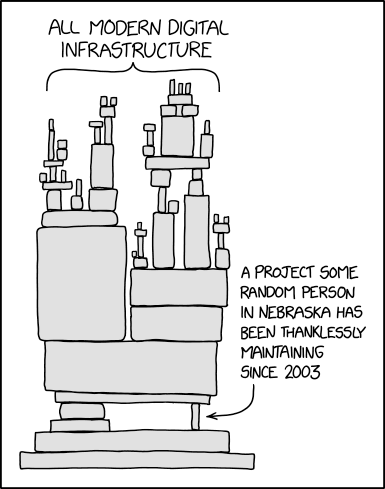Earlier today, I happened across an essay written in 1995 by Niklaus Wirth, creator of the Pascal programming language among other things. It started me off thinking about 1995 and what the computer world was like at the time (almost 30 years ago  ).
).
* No wifi. The 802.11 standard that was the basis of wifi as we know it today wasn't established until a couple of years later.
* The World Wide Web was still quite new and small. The specs for the HTML markup language were published in 1991, and Mosaic, the first widely-used web browser appeared in 1993.
* PCs were using Windows 95 and Macs were using System 7.5 (or thereabouts). The first Palm PDA handheld device was still a year away.
* Dial-up modems and floppy disks were still a thing (even though the disks weren't floppy any more).
* The Mac laptop of the time weighed 7.3 pounds and was 2.3 inches thick.
* The first commercially available cameraphone was still 5 years off.
* Although the web existed at the time, the online world was still dominated by pay-to-play services like CompuServe, America Online, Genie, and Prodigy, where you were charged by the minute for your connection time. (Doom-scrolling was not yet a thing.)
* I'd been a technical writer for tech companies and computer magazines for 10 years or so. I was wired in to the tech world and knew a fair amount about the hardware and software of the time and how it worked. Today I know a bit, but almost all of what I knew then is useless. And I don't miss it, either.
 ).
).* No wifi. The 802.11 standard that was the basis of wifi as we know it today wasn't established until a couple of years later.
* The World Wide Web was still quite new and small. The specs for the HTML markup language were published in 1991, and Mosaic, the first widely-used web browser appeared in 1993.
* PCs were using Windows 95 and Macs were using System 7.5 (or thereabouts). The first Palm PDA handheld device was still a year away.
* Dial-up modems and floppy disks were still a thing (even though the disks weren't floppy any more).
* The Mac laptop of the time weighed 7.3 pounds and was 2.3 inches thick.
* The first commercially available cameraphone was still 5 years off.
* Although the web existed at the time, the online world was still dominated by pay-to-play services like CompuServe, America Online, Genie, and Prodigy, where you were charged by the minute for your connection time. (Doom-scrolling was not yet a thing.)
* I'd been a technical writer for tech companies and computer magazines for 10 years or so. I was wired in to the tech world and knew a fair amount about the hardware and software of the time and how it worked. Today I know a bit, but almost all of what I knew then is useless. And I don't miss it, either.

Last edited:




